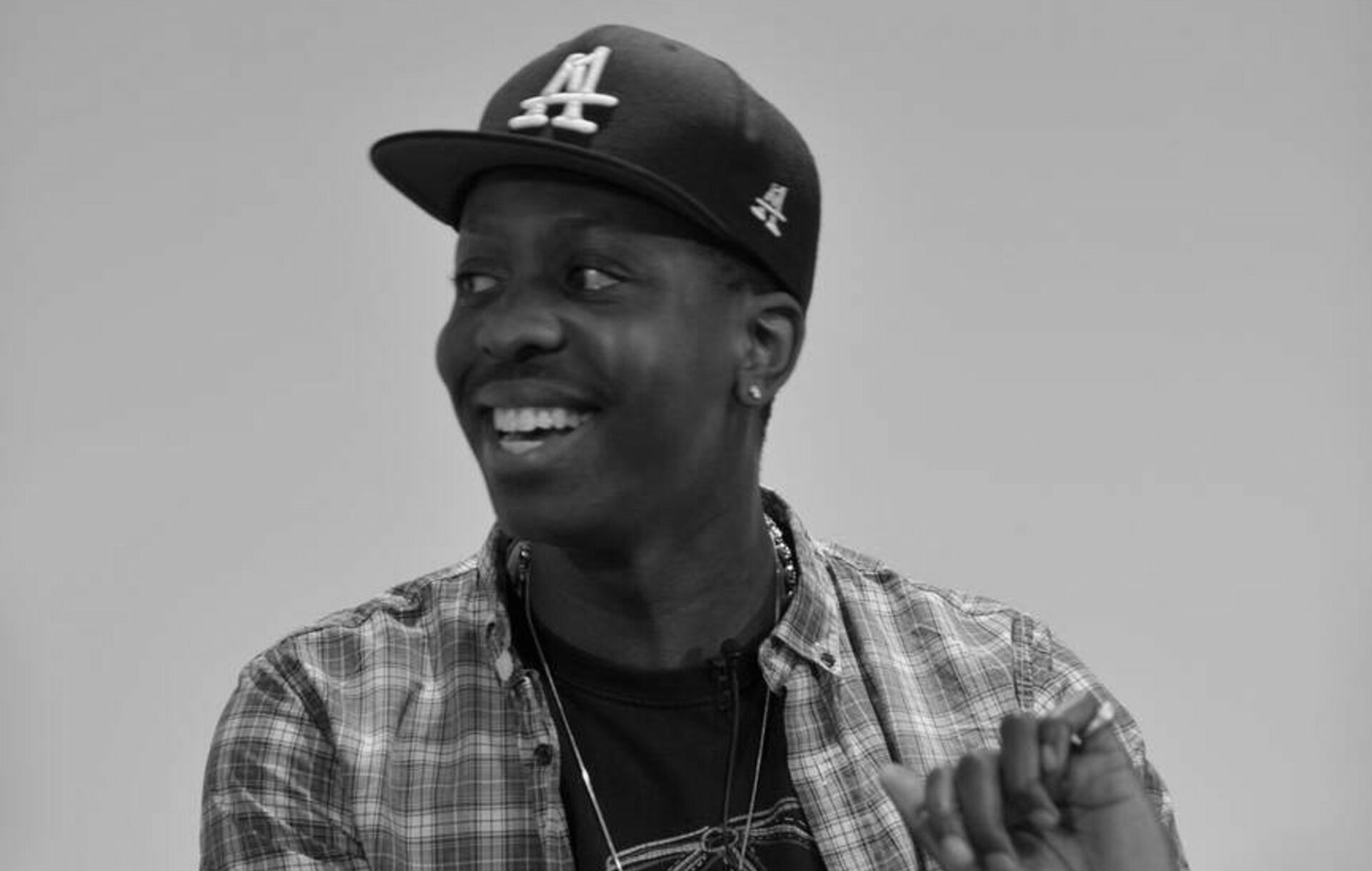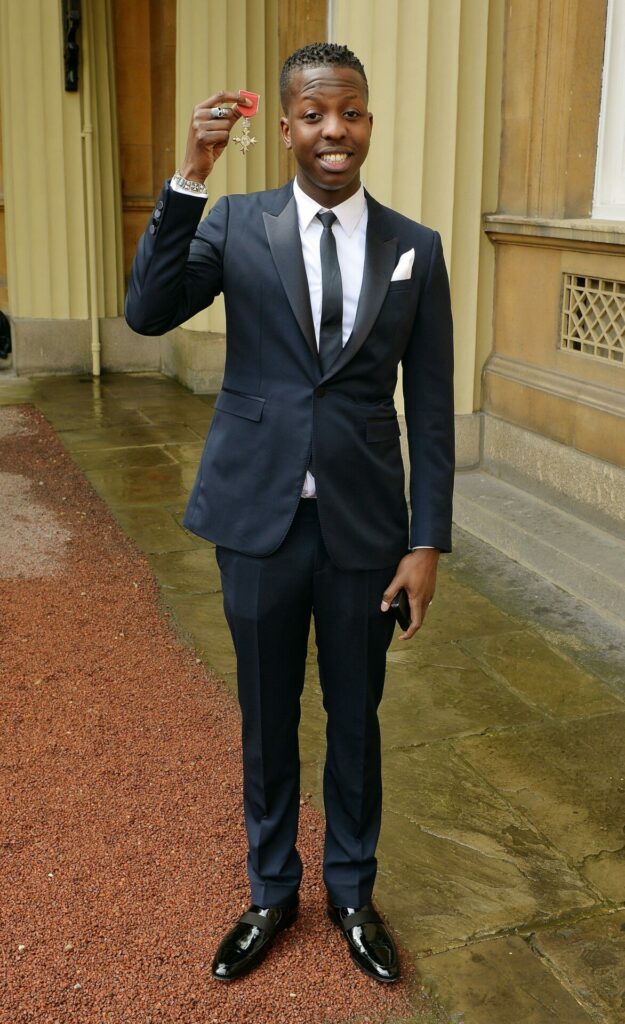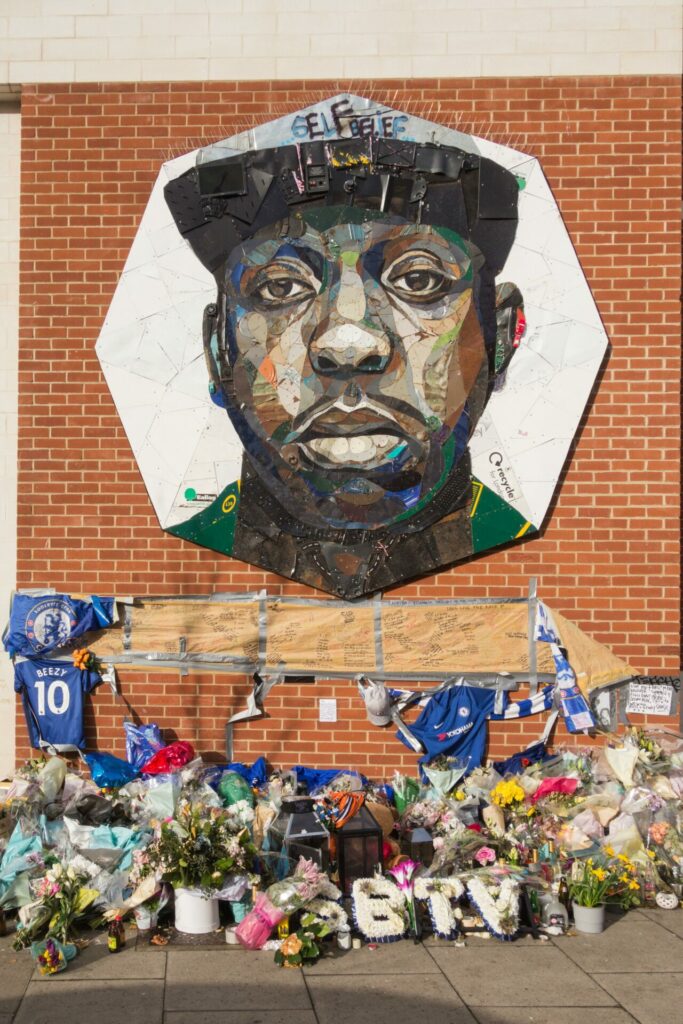Jamal Edwards: the man who changed the British music scene
At 15, Jamal Edwards started a media empire shining a light on emerging music stars. Sadly, in February 2022, the SBTV founder passed away aged 31. His collaborators, friends and employees reflect on how he changed the industry for Black British talent
By Nana Baah

When the news of the untimely death of British music mogul Jamal Edwards was announced on the morning of 21 February, it sent shockwaves through London, the UK music scene and beyond. Tributes from the royal family and billionaires like Richard Branson, as well as music’s big names poured in on social media. That evening, hundreds of people flocked to Edwards’ mural in Acton, west London, where he grew up. The ground beneath it was covered with bouquets of flowers, condolences written by friends and strangers, and Chelsea FC scarves — Edwards’ favourite team. His mother, Brenda Edwards stood in front, singing to honour his life.
Less than four months earlier, in November 2021, after delays caused by Covid and a struggle to find the right place for it, Edwards’ mural had been unveiled on Acton High Street. The large-scale portrait of his face was constructed from recycled metal sourced from his local council and created in Bollo Brook Youth Centre, one of four Edwards reopened to give opportunities to young people. It was made from the same stuff Edwards was: Acton and hard work.

His name is one that will be inextricably tied to some of the biggest stars in the British music world and overseas for ever. If you’ve heard of Dave, or Stormzy or AJ Tracey, that’s partly down to him.
At 15, armed with a camera gifted to him by his mum, he began filming his friends and himself under the moniker Smokey Barz. He uploaded those videos onto SBTV, a YouTube channel that would become a media empire. Not only did it make Edwards a multimillionaire, but it led to him dedicating his career to changing the landscape of British music for good.
Edwards started SBTV from his bedroom in 2006, just a year after Form 696 came into effect across 21 London boroughs. A risk-assessment document created by the Metropolitan Police, it led to the closure of events playing predominantly Black music genres — garage, bashment, R&B. Up-and-coming artists were suddenly faced with a huge problem: with nowhere to showcase their talent, there was little to no chance of breaking out into the mainstream.
“His legacy is pure. He was definitely a businessman and an entrepreneur, but in the same breath, he was a humanitarian”
— Isaac Densu, friend of Jamal Edwards and SBTV’s chief creative officer
As an entirely digital platform, SBTV provided the remedy. If you were featured on the platform, with its ever-growing following and the encouragement of Edwards, you were guaranteed to attract attention.
SBTV became the place to catch interviews with established stars, such as Mary J. Blige and Kelly Rowland, as well as those on the threshold of mega-stardom, like Ed Sheeran — who counted Edwards as a close friend — and Rita Ora.
In 2011, a Channel 4 reality TV show Inside SBTV: From Bedroom to Boardroom aired about Edwards and his creation. The same year, a popular Google Chrome advert was released, charting the rise of SBTV. It was clear that SBTV was gaining serious momentum: it could no longer be ignored.
Edwards’ charisma meant that people were drawn to him. “What struck me immediately was that there was this young Black guy with a massive smile and a team of young people all from different backgrounds and ethnicities,” says Isaac Densu, Edwards’ close friend and SBTV’s chief creative officer, who was responsible for creating the reality TV show focused on the media empire.
The SBTV team was built on passion and self-belief alone. Nurturing new talent was a particular passion for Edwards.
When Georgia Lewis Anderson’s friend sent her Edwards’ tweet about looking for an SBTV host, the wannabe presenter quickly applied with a tape she made outside her flat. Days later, she met up with him in north-west London.
“He said he had this platform and that he has a Kelly Rowland interview tomorrow. So, I’m like, ‘I don’t believe you. Are you for real?’” says Lewis Anderson. “Obviously, I was gassed and I came the next day after some exams for my second year at uni and Kelly Rowland was there.”
“Jamal had crazy contacts… If we’d see someone was coming to town, like Rihanna, we would try any way to get her”
— Georgia Lewis Anderson, former SBTV interviewer
After becoming an SBTV presenter, Lewis Anderson got to witness Edwards’ knack for securing celebrity interviews first-hand. “Jamal had crazy contacts,” she reveals. “Some people approached us wanting to be a part of [SBTV]. If we’d see someone was coming to town, like Rihanna, we would try any way to get her. It didn’t always work but that was just Jam, though. It was fun, but it was also a lot of hustle and hard work.”
Lily Mercer, DJ, founder of Viper magazine and the former online editor at SBTV, believes meeting Jamal shaped her whole career as a music journalist. “Within about two years of working with him, he was asking me to interview Wu Tang, ASAP Rocky, Kendrick Lamar and Mary J. Blige,” she says.
“He had a lot of trust in me, very early on in my career. Those were the first interviews I did outside of uni. You don’t realise how possible something is until you see someone else do it first-hand. He was a rare character to be able to get that access, but he made me realise that if you’re talented, passionate and you have that drive it’s not unthinkable to have your own publication or your own media company.”
In his 2013 book, Self Belief: The Vision: How to Take Control on Your Own Terms, Edwards writes: “Sometimes all it takes is for one person to give you permission to have a go at pursuing your ideas […] I want to try to be that person for anyone who reads this book.”

For some of the UK’s favourite musicians, he was indeed that person. One of them, Che Lingo, a British rapper who first met Edwards in 2014 and appeared on SBTV, says his encouragement changed the trajectory of his career. “People had believed in me before,” says Lingo. “But Jamal really encouraged me, both publicly and privately and very unapologetically. He put me in a great position to understand how to perform these things I’d written with confidence.
“There are people [in the music industry] who will want to dim your light rather than watch you shine on their platform,” Lingo continues. “But Jamal, after hearing people talk about me, he just didn’t hesitate to get me in to meet him. He was genuinely impressed by what he saw, and I put numerous videos on his channel, and he never put me in a position to have to think transactionally about it,” he recalls. “I’ve still got people that will say ‘I love all your stuff’ and that they found me on SBTV back in the day and that’s 10 years ago now. So, he’s given me core fans.”
As far as motivational speakers go, Edwards stood out. There was no social media presence chock-full of recycled quotes. His feeds remain a point of support and celebration for his mum and his friends in the industry, and Edwards’ hands-on approach leaves ripples in all avenues of the music industry to this day.
Part of his legacy, many believe, is in bringing about cultural change and helping to push open the doors for Black people.
“People had believed in me before. But Jamal really encouraged me, both publicly and privately and very unapologetically”
— Che Lingo, rapper
“If a young Black man in a tracksuit goes into a place of business, no one’s really going to blink any more,” says Mercer. “I personally think it was Jamal who led that change.”
Lewis Anderson shares an anecdote about going with Edwards to interview Flo Rida at a popular London nightclub. Edwards was refused entry but she, his white employee, was allowed in. “It was shocking how much wasn’t led by Black figureheads at the time. Even looking at how Richard Branson and Prince Charles paid tribute to Jamal, we wouldn’t really hear people like that give respect to young Black men. We’re seeing the power of Black music being in Black people’s hands.”
Densu, who left a job as a commissioner at one of the UK’s biggest TV channels to work at SBTV, agrees. “It’s down to a combination of technology and visionaries like Jamal that over the past decade gatekeepers have lost their control over the culture,” he says. “There’s a new generation of opportunities transforming the way we tell our stories on our own terms. The thing that excites me the most is that now a lot of these companies are building the infrastructure to employ people from our community without it being tokenistic.”
“He’s definitely one of the founding fathers of Black UK media because the scene changed when he started to grow,” says Lingo. “There are a lot of platforms that wouldn’t exist without Jamal and SBTV. It’s just facts. You didn’t really see Black faces in vlogs before so it was intimate and kind of personal because when somebody went on there, you were excited because you knew you were watching somebody that could be massive in future. He really knew how to pick those gems.”
For all the waves he caused in the music industry, Edwards wanted to bring about change.
“Every Christmas, he would go to a homeless shelter,” says Densu. Although usually understated, the charity work he did in Acton turned lives around.
“He was a force of nature,” says Dr Rupa Huq, MP for Ealing Central and Acton. He first met Edwards when he came to one of his surgeries, brimming with ideas about the youth-work charity he was setting up. In the years that followed, they attended council functions together, such as the opening of a youth centre or switching on the Christmas lights.
“He was never bombastic, showy or self-aggrandising,” explains Huq. “In the days following Jamal’s death, charities I work with — Acton Homeless Concern, Ealing Soup Kitchen, Ealing Wildlife — [were] mourning his passing and praising him for helping out behind the scenes there.”
“He was a force of nature… In the days following Jamal’s death, charities I work with — Acton Homeless Concern, Ealing Soup Kitchen, Ealing Wildlife — [were] mourning his passing and praising him for helping out behind the scenes there”
— Rupa Huq, MP for Ealing Central and Acton
Matt Small, the artist behind the mural, met Edwards beforehand. “At first, he was like, ‘Oh no, a picture of me’ and he was a bit embarrassed in that humble way he had,” says Small. “But Jamal was quite enthusiastic about it when he realised it’s about what he represents. He’s a guy who got fame and respect because of what he has done, which is really a benefit to our culture and society. He represents going above and beyond for the greater good.”
His mural is a reminder of Edwards’ success and vision, something that continues to inspire his friends and co-workers after his death.
“One of the things that’s really struck me since he’s passed is that there are good people in the world, but everyone has their own capitalist dream. But Jamal, a man with the world at his feet, didn’t subscribe to that,” says Densu. “Certain decisions would mean that we would make a lot of money, but Jamal would think about the cost: is it going to cause unhappiness? That was his main thing. His legacy is pure. He was definitely a businessman and an entrepreneur, but in the same breath, he was a humanitarian.”
Taken from the June/July 2022 of Rolling Stone UK. Buy it here.
